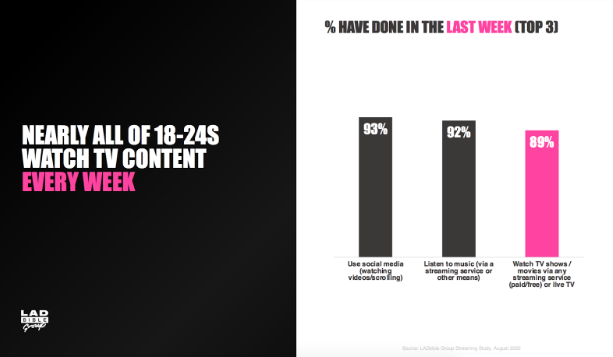In this week’s Week in Review: DoubleVerify uncovers a new variant on a CTV fraud scheme, TikTok searches for someone to lead its CTV efforts, and TF1 and M6 prepare concessions to ease the path to their planned merger.
Top Stories
Smart Fridges Pose as CTV Devices in New Fraud Scheme
DoubleVerify reported a newly uncovered connected TV ad fraud scheme this week, in which smart fridges and other internet-connected devices essentially posed as connected TVs, in order to cover up fraudulent traffic.
DoubleVerify said the scheme is a variant of LeoTerra, an existing server-side ad insertion (SSAI)-based fraud scheme first identified in 2020. The fraudsters downloaded lists of real online devices, and used that data in fraudulent ad requests to make it look like traffic originated from real CTV viewing. This list contained CTV devices, as well as smart fridge, smart watches, and other connected devices.
“This latest iteration of LeoTerra shows how fraudsters are always looking for new ways to avoid detection,” said Roy Rosenfeld, head of DV’s Fraud Lab. “It also highlights how easily they spoof millions of devices by simply rotating through device lists that are free and easily accessible online.” DoubleVerify claims the new variant will have cost advertisers up to $10 million in wasted spend this year.
TikTok Signals Renewed Push into CTV
TikTok looks to be renewing its efforts to grow its audience for its connected TV app, as the short form video app is looking to hire someone to lead user growth on CTV.
The ad, first reported by AdAge, says that the new role will involve “driving TikTok’s connected TV product strategy, value proposition and growth,” and will be required to “build, test, and grow daily active users and improve product retention.”
As VideoWeek has previously reported, TikTok has already invested in CTV, rolling out apps on a number of platforms. But the product is still young and relatively experimental, and doesn’t yet run ads.
TF1 and M6 Offer to Keep Ad Businesses Separate for Three Years
TF1 and M6 have offered concessions to l’Autorité de la concurrence to assuage its competition concerns. Last month the French authority expressed misgivings over the impact the proposed merger would have on TV advertising, as the combined entity would control approximately 75 percent of the market. The broadcasters’ offer includes keeping their advertising businesses separate for three years after the merger, limiting the distribution of French films on their channels, and extending distribution agreements with Canal+, Orange, Free and SFR.
The pair originally stated they would not concede to the regulator’s proposals, arguing they would render the deal redundant. “The nature and extent of the remedies required in the report would mean that the merger plans would no longer be meaningful for the parties involved and they would therefore abandon them,” TF1 said in a July statement. Gilles Pelisson, the company’s Chairman and CEO, previously vowed that any demands for M6 or TF1 to sell either flagship channel would be a dealbreaker. A final decision is expected in October following hearings in September.
The Week in Tech
Whistleblower Lifts Lid on Twitter Security Negligence
A whistleblower at Twitter revealed the company is covering up major technical and management lapses that pose a threat to national security, with its most sensitive data accessible by too many of its staff, at least one of whom could be working for a foreign intelligence service. CNN and The Washington Post reported on Tuesday that Peiter “Mudge” Zatko, former head of security at Twitter, sent the explosive disclosure to Congress and federal agencies last month. Though the whistleblowing process predates Elon Musk’s involvement, it confirms the billionaire’s claim that Twitter lacks the resources or motivation to understand the number of bots on the platform. Zatko is due to appear before the Senate Judiciary Committee next month.
ICCL Launches Class Action Against Oracle
The Irish Council for Civil Liberties (ICCL) has started a class action lawsuit against Oracle, the ad tech giant that counts Moat, Cerner and Grapeshot among its recent acquisitions. Dr Johnny Ryan, Senior Fellow of the ICCL, is one of three class representatives aiming to stop Oracle’s “global surveillance machine.” It claims that Oracle’s dossiers include people’s home addresses, emails, purchases, physical movements, income and detailed accounts of online activity. The complaint alleges violations of the Federal Electronic Communications Privacy Act, the Constitution of the State of California, the California Invasion of Privacy Act, competition law and common law.
Google Plans Anti-Disinformation Campaign in Central Europe
Google subsidiary Jigsaw is set to launch a campaign to tackle disinformation in Poland, Slovakia and the Czech Republic relating to Ukrainian refugees. “Psychologists from the universities of Cambridge and Bristol have produced 90-second clips designed to “inoculate” people against harmful content on social media,” Reuters reported on Wednesday. The clips are designed to help people identify anti-refugee scapegoating and emotional manipulation in news headlines, and will run in ad slots on YouTube, Twitter, TikTok and Facebook.
Norwegian Watchdog Seeks Facebook Fine
Norwegian data protection authority Datatilsynet has called for fines against Facebook for its shuttling of European personal information to the US. The comments follow a draft decision by the Irish Data Protection Commission that orders Meta to cease its use of standard contractual clauses (SCC) for data transfers between EU and non-EU countries. “While orders, limitations and bans generally seek to ensure that future data processing of personal data takes place in line with the GDPR, sanctions such as administrative fines are directed towards violations in the past and carry a punitive element,” said Datatilsynet.
Facebook Settles Location Tracking Lawsuit
Meta reached a $37.5 million settlement for a lawsuit accusing Facebook of tracking users’ movements through their smartphones without permission. The suit began in November 2018, claiming the company used IP addresses to send targeted advertising to non-consenting users. The preliminary settlement was filed on Monday in San Francisco federal court, where it awaits a judge’s approval.
Snapchat Reaches Settlement in Illinois Class Action
Snap also reached a $35 million settlement for a class action this week, after Snapchat was accused of violating the Illinois Biometric Information Privacy Act in its use of facial recognition technology. The suit covers Illinois residents who have used Snapchat lenses or filters since November 2015. The settlement is now awaiting approval from a District Court, according to the settlement administrator.
Google DV360 Rolls Out Digital Out-of-Home Ads
Google has made digital out-of-home ads available to all Display & Video 360 users, it announced in a blog post on Thursday. “Marketers can activate, pause, and optimize digital out-of-home campaigns in near real time,” said Shreya Mathur, Product Manager at DV360. “They can tackle everything from strategy and activation to reporting and optimization all in one place.” The company confirmed it already partners with exchanges including Hivestack, Magnite and PlaceExchange, providing programmatic access to the likes of ClearChannel, Intersection and JCDecaux.
IAS Privacy Report Puts Contextual Targeting on the Agenda
Brands should align ads with contextually relevant content, according to Integral Ad Science’s (IAS) 2022 Future of Privacy-First Advertising Report. Released in partnership with YouGov and a market research firm, the report found that 66 percent of consumers are likely to visit a brand’s website after being served a targeted advertisement. The study also revealed a lack of consumer confidence in the security of their online data, and inaction by media companies when it comes to managing forthcoming policy changes. “With upcoming online data and privacy policy changes coming down the pipe, privacy continues to be a priority for both consumers and media experts,” said IAS Global CCO Yannis Dosios.
Google Faces Scrutiny Over Advertising Emails
Google is sending unsolicited marketing emails directly to Gmail inboxes, according to a complaint filed by Austrian advocacy group NOYB with French watchdog CNIL. These adverts look like normal emails except for the word “ad” below the subject line, and seemingly bypass the Gmail spam filters. “It’s as if the postman was paid to remove the ads from your mailbox and put his own instead,” said NOYB programme director Romain Robert, alleging that the practice breaches an EU court ruling from 2021.
The Week in TV
Paramount Pays Record $1.5 Billion for Champions League Rights
Paramount has scored a $1.5 billion rights package to continue broadcasting the UEFA Champions League on CBS. The record sum is 2.5 times the value of the US broadcaster’s previous Champions League contract, according to the FT. The agreement follows NBC’s $2.7 billion partnership with the Premier League announced in November 2021. The FT noted that the deal does not cover Spanish-language rights, which could take up to 12 months to secure.
Netflix Nixes Ads in Kids Shows and Original Movies
Netflix will not run advertising on original films or kids programming, the streaming giant told its commercial partners this week. According to Bloomberg, this is down to the concerns of high-profile filmmakers, and studios disallowing adverts in their content. Ampere Analysis said the ad-supported version of Netflix could generate $3-4 billion a year in ad sales; $1.9 billion in Western Europe and $2.1 billion in North America. Meanwhile ad tier subscription fees are expected to reach $841 million in Western Europe and $1 billion in North America.
DAZN Beta Tests Betting Brand in the UK
DAZN has announced the UK as a testing ground for its gambling brand DAZN Bet. First announced in April alongside gambling tech provider Pragmatic Group, the integration sees the sports streamer attempt to diversify its revenue streams. The beta launch in the UK will allow DAZN Bet to see how subscribers interact with gambling, ahead of plans to launch in Spain and other European markets later this year.
Plex Warns of Security Breach
Plex sent an email to its customers on Wednesday notifying them of a security breach. The streaming service said account information could be compromised, including usernames, email addresses and passwords. The company reassured customers that there was no risk to financial information, as credit card and other payment data are not stored on the Plex servers.
HBO Max Crashes (Again)
The HBO Max debut of Game of Thrones spinoff House of the Dragon was plagued by technical issues, The Verge reported on Sunday. Most of the users claiming the app crashed or froze were watching on Amazon Fire TV. It has been a rough few weeks for the streamer, which is to be folded into Discovery+ following reports of titles being pulled from the platform. Back in February HBO Max also crashed ahead of the season 2 finale of Euphoria.
Study Finds UK Adults Overwhelmed by Streaming Services
The average UK adult spends over four days a year searching for what to watch, the LADbible Group TV Report revealed on Tuesday. Other findings included more than half UK adults sharing SVOD passwords, around three-quarters suggesting the TV Licence fee does not represent good value for money, and roughly half feeling overwhelmed by the number of streaming services. “We found reports that cite the end of young people’s interest in watching TV content to be exaggerated,” said Anna-Lee Bridgstock, Director of Data, Intelligence and Planning at LADbible Group. “There is a huge appetite for content but the sheer amount of TV shows and number of services to watch them on is leading to a huge amount of time endlessly searching for what to watch.”
Sky, Samaa TV and Studio 66 TV Under Fire from Ofcom
Ofcom has found Sky in breach of rules requiring “electronic communications services” to notify customers towards the end of their minimum contract period. According to the ruling, pay-TV services fall under this bracket, despite objections by the broadcaster. The watchdog has ordered Sky to comply with regulatory obligations to send end-of-contract notifications to its pay-TV customers. Also this week, Ofcom fined Samaa TV for anti‑Ahmadi and antisemitic hate speech, and Studio 66 TV for five separate instances of sexually explicit advertising broadcasts.
Swedish SVOD Market Weathers Economic Storm
The Swedish SVOD market is growing in spite of the cost-of-living crisis across Europe, Mediavision has found. In fact Q2 2022 proved a record quarter for the paid streaming market, with SVOD penetration reaching 61 percent of households, up 5 percent year-on-year. The average Swedish SVOD household pays for 2.2 services, and the market is now approaching six million streaming subscriptions, Mediavision said. “Our figures show that households plan to acquire even more streaming services,” commented Mediavision CEO Marie Nilsson. “Growth is expected to be driven primarily by existing streaming households that acquire more services.”
The Week for Publishers
G/O Media Offers Brand Lift Guarantees
Digital publisher G/O Media has begun offering KPI guarantees for advertisers, which it says is designed to provide security for advertisers who are nervous about economic conditions. The offering will guarantee brand lift metrics, with advertisers choosing three out of five metrics: awareness, consumer consideration, favourability, message association and purchase intent. G/O Media will then only pay when an independent researcher finds a significant lift in one of those three metrics.
US Senators Introduce Bill to Facilitate Publisher Negotiations with Big Tech
A bipartisan group of US senators have introduced a bill, The Journalist Competition and Preservation Act, designed to make it easier for publishers to negotiate with platforms like Google and Facebook over payments for their content. The bill would “remove legal obstacles to news organisations’ ability to negotiate collectively and secure fair terms from gatekeeper platforms that regularly access news content without paying for its value,” according to a statement released by the group of lawmakers.
Reach Journalists Postpone Strike Action
Journalists working for UK publishing group Reach have called off strike action at the last minute, as negotiations over pay have been reopened with the company. Journalists had originally been due to walk out on Friday – further strikes are still scheduled for next week, and are set to go ahead if an agreement can’t be reached.
Twitch Will Begin Letting its Partners Stream on Rival Platforms
Twitch, the Amazon-owned live streaming platform focused on gaming, has announced it will now allow the majority of its partnered creators to stream on rival platforms like YouTube, Facebook Gaming, moving away from its previous strategy of locking in partners with exclusivity clauses. “Starting today, you are now allowed to create live content on other platforms,” Twitch said in an email sent out to partnered streamers. “This means that you have more flexibility to explore how to use different, off-platform features to further build your community and interact with streamers off Twitch.” Read more on VideoWeek.
DC Thomson Lays Off Head of Podcasts in Audio Rethink
Publishing group DC Thomson have made Christopher Phin, its head of podcasts, redundant as part of an overall rethink of its audio strategy. DC Thompson helped develop a number of popular podcasts during his tenure, and DC Thomson says it remains committed to podcasting despite the change.
New York Times and Mail Online see Year-on-Year Growth in July
The New York Times and Mail Online were the only two out of the world’s top ten online news publishers to see year-on-year audience growth in July, according to Press Gazette’s analysis of Similarweb data. The New York Times saw a Wordle-aided 73 percent bump in its monthly global visits, while Mail Online saw three percent growth.
Google Search Rework Targets SEO Gaming
Google has announced an update to its search algorithm which it says will prioritise “helpful content”, deprioritising “unsatisfying content” which has been crafted specifically to appear highly in search results. Specifically, Google says it will award lower rankings to content which mostly summarises other sites’ content without adding much value of its own.
The Week For Agencies
WARC Predicts Ad Slowdown, but not Recession, in 2022
WARC forecasts that global ad spend will be up by 8.3 percent over the course of 2022, thanks in part to boosts from the US midterm elections and FIFA World Cup. But the research body expects ad spend growth to slow to 2.6 percent next year – a significant slowdown, but not a retraction. Ad spend in the video streaming market however is expected to reach 8.4 percent growth this year, and to remain high at seven percent next year.
O2 Virgin Media Hands Media Duties to MG OMD
Omnicom’s MG OMD has won O2 Virgin Media’s media duties, Campaign reported this week, after the newly merged telco reviewed its ad business. The account is worth around £115 according to Campaign.
Penguin Random House Takes More Ad Duties In-House
Publishing group Penguin Random House is planning to invest more in its in-house ad capabilities as part of an overall rethink of its marketing department, The Drum reported this week. The move has also seen Penguin Random House merge its marketing and PR departments into one single brand team.
Ex-MDC Executive Launches New Performance Agency
Michael Bassik, a former executive at MDC Partners, has launched a new performance agency called Optimal, Adweek reported this week. “I thought there was an opportunity to create a scaled digital performance marketing business that wasn’t just focused on lower funnel—that was focused on full funnel,” Bassik told Adweek in an interview. Optimal brings together four existing agencies: performance shop Optimad Media, and its three acquisitions DSPolitical, UNTU, and Effective Spend.
Dentsu Reports Competitive Advantage from Mass Offshoring
Dentsu says it has seen “tremendous growth” as a result of offshoring 10,000 jobs, Campaign reported this week, as the move has enabled it to cut costs at a time when clients are wanting to keep their own costs low.
The7stars Launches New Data Initiative ‘Bridge’
UK independent media agency the7stars has launched Bridge, a new data clean room offering powered by InfoSum. The7stars says The Bridge will help clients access and use data from the biggest media and data owners across the UK, in a privacy-safe manner.
France Becomes First European Country to Ban Fossil Fuel Adverts
The French Government has enacted a ban on adverts for fossil fuels, outlawing natural gas ads from the beginning of 2023. The proposal emerged from a 2019 convention on climate change, comprised of 150 citizens whose names were drawn out of a hat. But the ban has been criticised by environmental campaigners who view it as a piecemeal reform; a compromised version of the initial proposal to outlaw all forms of advertising by oil companies. Read more on VideoWeek.
Hires of the Week
Anna Bateson Picked as New Guardian CEO
Guardian Media Group has appointed Anna Bateson as its full time chief executive, replacing interim chief executive Keith Underwood. Bateson herself previously served as interim chief executive in 2020.
Pinterest Picks Stacy Malone as VP of Global Business Marketing
Pinterest has hired Stacy Malone as its new vice president of global business marketing, where she will set the companies strategy for reaching agencies and other business partners. Malone joins from Meta, where she led the North America business marketing team.
Lawrence Horne Picked to Lead DoubleVerify in Northern Europe
DoubleVerify has appointed Lawrence Horne as its regional vice president for Northern Europe, based in London. Horne will be responsible for maintaining senior relationships with the company’s largest global customers and leading regional sales teams.
This Week on VideoWeek
PSBs Urge Government to Protect “Crown Jewel” Sports, read on VideoWeek
For Online Video Players, Competition Comes Down to the Little Details, read on VideoWeek
France Becomes First European Country to Ban Fossil Fuel Adverts, read on VideoWeek
Twitch Will Begin Letting its Partners Stream on Rival Platforms, read on VideoWeek
Do Mobile Video Ads Drive Attention? read on VideoWeek
Ad of the Week
Carlsberg, Forever Fans, The Nework






